As Netizen Power Grows, So Do Concerns
As Netizen Power Grows, So Do Concerns
Posted February. 17, 2006 03:11,
Shin Jin-woo, a 26-year-old Hoseo University senior majoring in drama who masterminded a recent subway marriage ceremony performance that made headlines recently, announced yesterday that the wedding ceremony was actually a guerrilla-type performance produced by the drama club of his department.
I wanted to inspire people by showing a wedding performance conducted by underprivileged people, he said. I would like to offer my apologies to those who believed that our drama was real and bestowed encouragement and affection to the couple.
But netizens instantly turned on him, posting messages on Internet boards saying, Theyve made sport of people who were inspired by such a warm story.
Experts say this incident shows a side of cyber culture that offers both collective praise and criticism without checking the truthfulness of information.
Others point out that Internet backlash generated from false information may cause greater damage when intentionally misused.
An incident involving a woman who did not clean up after her pet in the subway last June is a prime example of this cyber backlash phenomenon.
A woman received intense criticism from netizens after videotape showed her leaving a subway train without cleaning up after her pet. Afterwards, several netizens spread a rumor that she was attending a certain department of a certain school. The departments homepage was forced to shut down soon afterwards because of attacks from netizens.
The cyber culture phenomenon of fishing, or distributing false information in order to entice netizens to visit personal homepage or blogs, has also added to the confusion of the Internet backlash phenomenon.
Professor Seo Yi-jong from the Department of Sociology at Seoul National University said, In an Internet environment where numerous anonymous people have access at the same time, overall responses tend to wax and wane easily. It is becoming more and more likely that commercial advertisements or events that use this may pose as facts or real anecdotes.
Experts point out that indiscriminate reporting that does not undergo even a preliminary checkup of facts can help create this type of culture.
In fact, certain online and offline media outlets continued to file reports with headlines such as, The Tearful Subway Wedding and Lets Send the Subway Wedding Couple on a Honeymoon, without additional fact checking after the subway wedding report was initially announced on February 14.
Professor Heo Seok-ryeol of the Department of Sociology at Chungbuk National University stated that this is a farce created by Internet culture and the medias hunger for quick news flashes, and pointed out that if the media does not check its facts, this may very well become a bigger problem.
zeitung@donga.com weappon@donga.com







